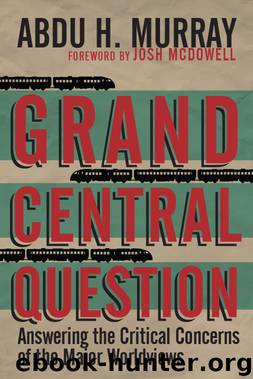Grand Central Question: Answering the Critical Concerns of the Major Worldviews by Murray Abdu H

Author:Murray, Abdu H. [Murray, Abdu H.]
Language: eng
Format: epub
Publisher: InterVarsity Press
Published: 2014-02-21T00:00:00+00:00
The Karma Chameleon
Pantheism’s teaching about how we are to achieve a sense of unity with the divine is not new or exotic. Karma is, at its core, a works-based belief system that says what almost every other religion and worldview says: if you are a good enough person, you can achieve heaven, enlightenment, bliss, Nirvana, whatever. Islamic salvation is based on a person’s merit in following God’s will. Modern Judaism says that our eternal reward is based on our works, and the largest religion in the world—Good Personism—tells us that we’ll get to heaven if we’re good people. Karma is a chameleon doctrine because it can be adopted and adapted to fit every worldview. And so pantheism isn’t all that exotic after all.
Some have tried to put the Christian faith into a karmic paradigm by arguing that the Bible, too, teaches that “what goes around comes around.” A verse they rely on is Galatians 6:7, which reads, “For whatever one sows, that will he also reap.” But the context of this passage reveals that it is not referring to the consequences of our actions in some next life. Paul is talking about ultimate justice in an eternal hereafter. The very next verse says that “the one who sows to his own flesh will from the flesh reap corruption, but the one who sows to the Spirit will from the Spirit reap eternal life” (v. 8).
Karma is not about that at all. It is about the actions in one life affecting the circumstances in the next. Eventually everyone will work out his or her bad karma, resulting in impersonal absorption or nothingness, which means that there is no eternality to justice. Bliss or nothingness may be eternal in a pantheistic view, but justice is not. The karmic view of justice is totally at odds with the biblical view.
Jesus makes the point quite clear when dealing with the man born blind in John 9.
As he passed by, he saw a man blind from birth. And his disciples asked him, “Rabbi, who sinned, this man or his parents, that he was born blind?” Jesus answered, “It was not that this man sinned, or his parents, but that the works of God might be displayed in him. We must work the works of him who sent me while it is day; night is coming, when no one can work. As long as I am in the world, I am the light of the world.” Having said these things, he spat on the ground and made mud with the saliva. Then he anointed the man’s eyes with the mud and said to him, “Go, wash in the pool of Siloam” (which means Sent). So he went and washed and came back seeing. (John 9:1-7)
Download
This site does not store any files on its server. We only index and link to content provided by other sites. Please contact the content providers to delete copyright contents if any and email us, we'll remove relevant links or contents immediately.
The Secret Power of Speaking God's Word by Joyce Meyer(3161)
Signature in the Cell: DNA and the Evidence for Intelligent Design by Stephen C. Meyer(3123)
Real Sex by Lauren F. Winner(3005)
The Holy Spirit by Billy Graham(2938)
The Gnostic Gospels by Pagels Elaine(2517)
Jesus by Paul Johnson(2349)
Devil, The by Almond Philip C(2324)
23:27 by H. L. Roberts(2245)
The Nativity by Geza Vermes(2224)
Chosen by God by R. C. Sproul(2158)
All Things New by John Eldredge(2153)
Angels of God: The Bible, the Church and the Heavenly Hosts by Mike Aquilina(1951)
The Return of the Gods by Erich von Daniken(1925)
Angels by Billy Graham(1917)
Knowing God by J.I. Packer(1848)
Jesus of Nazareth by Joseph Ratzinger(1802)
The Gnostic Gospel of St. Thomas by Tau Malachi(1781)
How To Be Born Again by Billy Graham(1775)
Evidence of the Afterlife by Jeffrey Long(1774)
